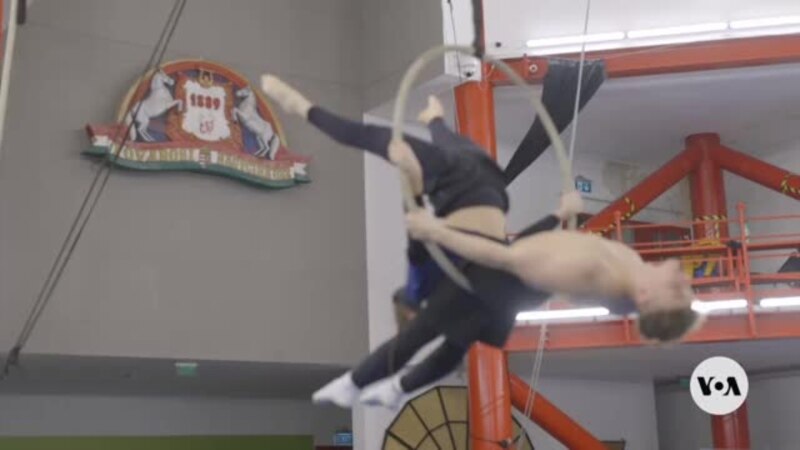
Hundreds of young Ukrainian circus performers have found a new home in Hungary, since fleeing Russia’s invasion of their country.
The Budapest Capital Circus, which has been putting on shows in the Hungarian capital since 1889, has taken in hundreds of young people between 5 and 20 years old over the past two years, along with several choreographers and trainers.
Among them is 18-year-old Alesa Astapova, who fled her home in Kyiv as Russia’s tanks approached the capital in March 2022.
“I’m really grateful because the circus gave me a place, gave me a possibility to train, to continue my job, my work, my passion. Now I’m studying in the Budapest Contemporary Dance Academy, so in the morning I’m dancing and in the evening, I do circus,” Astapova told VOA as she and several other performers practiced their routines at a facility on the outskirts of the Hungarian capital on a cold February evening.
The Ukrainians regularly take part in performances at the main circus arena in the center of the city. Its director, Peter Fekete, says he wants to help the young performers develop their careers.
“It was natural for us that when the war broke out and a bunch of children knocked on our door saying they had to leave their homes, we took them in. At the time, we thought that it would be a day, maybe a week, maybe a month later, that the war would end. But now it turned into two years,” he told VOA.
“Perhaps the most important thing that we have to provide them is a purpose in life,” he said. “So we give them a trial and, if possible, we choose our programs for them so that they can see that every day there is something to live for, something to work for, something to fight for,” Fekete added.
The circus has offered safety and focus for the young Ukrainians. But the future remains unknown. Many of the performers are from Kharkiv in eastern Ukraine, which has been devastated by Russia’s invasion.
“My family is still in Ukraine,” said 18-year-old Nikita Leshchenko. “They continue to live and work in Kharkiv because there is no other choice… when we call our relatives, they try to hide what is happening there. But we still know everything, we see everything from many sources. It’s horrible,” Leshchenko said. Despite the dangers, he is desperate to return. “Yes, there are many opportunities here, but I also really want to go home,” he said.
Mikhail Chepkiy, just 15 years old, is also struggling to work out his next move. “Europe is a continent of great opportunities. We really want to travel, to perform… but returning to Ukraine to see our families and spend time there is also very important. We will definitely go to Ukraine when this [war] is all over,” he said.
The young performers are well looked after in Budapest; the circus provides them with accommodation and meals, alongside study programs. But they are faced with difficult life decisions.
Alesa Astapova is desperate to see her mother, who still lives in Kyiv. But she believes it will take time for Ukraine to recover. “I think I will travel for a while. Because even if the war finally ends and everything will be safe, the country should have time to return, to get rhythm, to get some new financial support. And then maybe (I will go home)… but the next five years, I don’t think so.”
Director Peter Fekete believes the circus offers wider lessons.
“We are used to the fact that if someone jumps on one side, someone on the other side will catch him, regardless of whether he is Russian or Ukrainian. Ever since the war broke out, we have staged productions where Russians and Ukrainians help each other within the same show. I think it’s a message to the world, it’s a message about inclusion, acceptance, peace,” he said.
